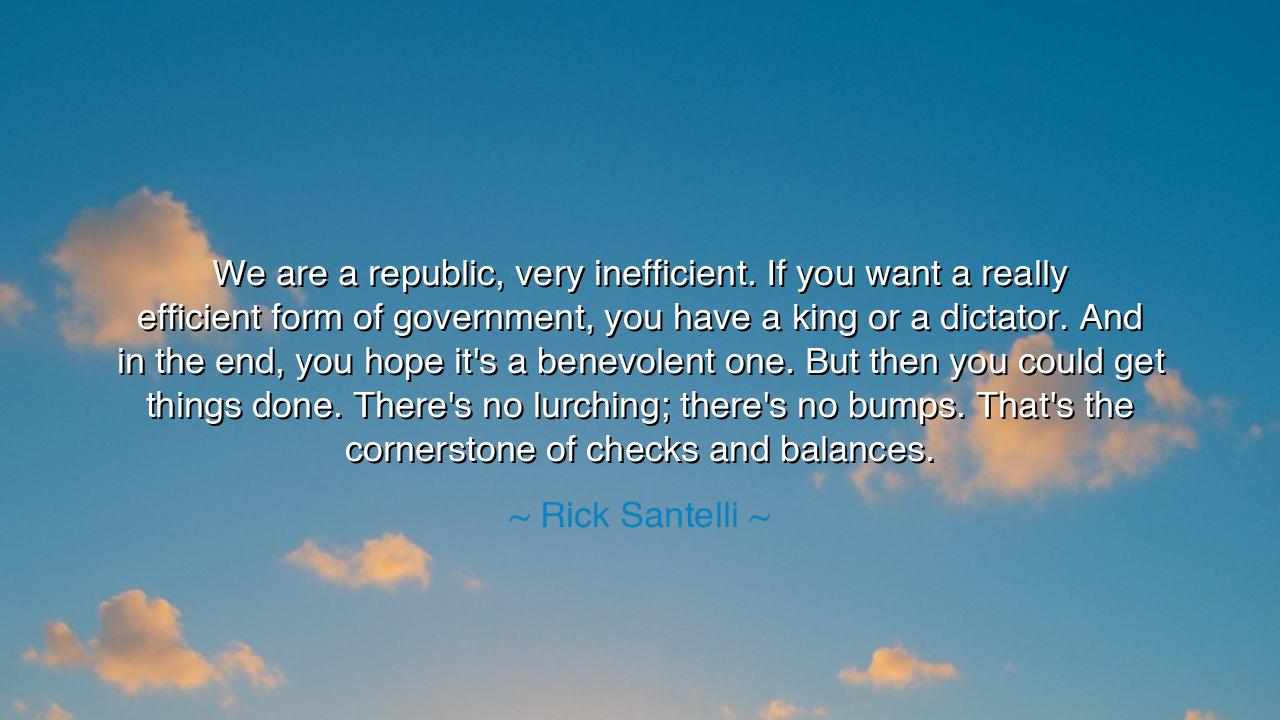
We are a republic, very inefficient. If you want a really
We are a republic, very inefficient. If you want a really efficient form of government, you have a king or a dictator. And in the end, you hope it's a benevolent one. But then you could get things done. There's no lurching; there's no bumps. That's the cornerstone of checks and balances.






Hearken, children of civic wisdom, and attend to the words of Rick Santelli, who spoke with piercing clarity: "We are a republic, very inefficient. If you want a really efficient form of government, you have a king or a dictator. And in the end, you hope it's a benevolent one. But then you could get things done. There's no lurching; there's no bumps. That's the cornerstone of checks and balances." In this declaration lies a meditation on freedom, governance, and the delicate tension between efficiency and liberty, a principle as ancient as the first assemblies of men.
The origin of Santelli’s insight springs from the observation of democratic governance in contrast to autocracy. A republic, by design, disperses power among branches, balances authority, and subjects rulers to accountability. Such a system may appear slow, cumbersome, or inefficient to the impatient eye. Yet this very inefficiency is the safeguard of liberty, for it prevents any single individual from wielding unchecked power, ensuring that governance serves justice and deliberation rather than whim.
Consider the imagery of a king or dictator, ruling with singular authority. Efficiency is indeed possible: decrees are immediate, laws enforced without delay, projects completed without debate. Yet this swiftness carries peril. The ruler’s whims, biases, and desires may dominate without restraint. History offers stark examples: Louis XIV of France, the Sun King, achieved vast reforms and monumental constructions, yet his centralized power imposed heavy burdens on the people, and efficiency came at the cost of personal liberty and equity. Santelli’s words remind us that the trade-off between efficiency and freedom is never free.
The wisdom of his observation resonates with the cornerstone of checks and balances. In a republic, the lurching, the bumps, the debates, and delays are not flaws—they are protections. Each branch of government, each safeguard, prevents the consolidation of power, ensuring that decisions are tempered by reason, law, and representation. In this system, progress may be slow, but the outcome is more just, more stable, and aligned with the will and rights of the people.
History provides heroic exemplars of this principle. The framers of the United States Constitution, in the aftermath of tyranny and revolution, deliberately designed a government with separated powers, knowing it would be slow and often contentious. Yet they recognized that the checks and balances they instituted would protect citizens from rash decisions, tyranny, and exploitation. Liberty, they understood, was worth the friction, the delay, and the inefficiency.
Santelli’s insight is also a call to appreciation for the dynamics of deliberation. In a republic, the process of negotiation, compromise, and oversight ensures that no single voice dominates. While the march of legislation may be uneven, it reflects the diversity of interests and the wisdom of the collective. Efficiency without accountability may produce rapid results, but the fruits are unstable, often unjust, and susceptible to collapse.
The lesson is eternal: liberty demands patience, vigilance, and tolerance for imperfection in governance. A system that appears inefficient is often a system designed to protect the people, ensuring that power is diffused and that no ruler acts unchecked. The friction, debate, and delay are not impediments—they are signs of a healthy republic, alive with scrutiny, dialogue, and protection of rights.
Practical actions emerge naturally: participate actively in civic processes, respect the deliberative mechanisms of government, value transparency and accountability over expedience, and cultivate patience in observing the machinery of a republic at work. In doing so, one honors the cornerstone Santelli identifies: checks and balances are the safeguard of freedom, ensuring that governance serves justice, not haste or whim.
If you wish, I can craft an even more epic, mythic version, turning Santelli’s reflection into a heroic narrative of liberty, vigilance, and the moral wisdom embedded in democratic friction—perfect for immersive audio storytelling. Do you want me to do that?






AAdministratorAdministrator
Welcome, honored guests. Please leave a comment, we will respond soon